小学教学英语语法连词介词
小学英语语法知识点归纳总结大全

小学英语语法知识点归纳总结大全英语语法是学习英语的基础,对于小学生来说尤为重要。
掌握英语语法知识可以帮助小学生正确使用语言,增强语言表达能力。
为了帮助小学生更好地学习英语语法,以下是一些常见的小学英语语法知识点的归纳总结。
一、名词(Noun)名词是用来表示人、物、地点、动物、植物等事物的词语。
名词分为可数名词和不可数名词。
1. 可数名词:表示可以一种一种数的事物。
例子:book(书)、cat(猫)、apple(苹果)2. 不可数名词:表示不能一种一种数的事物。
例子:water(水)、milk(牛奶)、rice(米饭)名词的复数形式:- 大多数名词在词尾加s形成复数形式。
例子:books(书)、cats(猫)、apples(苹果)- 以s, x, sh, ch结尾的名词,在词尾加es形成复数形式。
例子:buses(公交车)、boxes(盒子)、watches(手表)- 以辅音字母+y结尾的名词,变y为i,再加上es形成复数形式。
例子:babies(婴儿)、flies(苍蝇)、berries(浆果)二、代词(Pronoun)代词是用来代替名词的词语。
代词可以分为主格代词、宾格代词和物主代词。
1. 主格代词:在句子中担任主语的代词。
例子:I(我)、you(你)、he(他)2. 宾格代词:在句子中担任宾语的代词。
例子:me(我)、you(你)、him(他)3. 物主代词:表示所属关系的代词。
例子:my(我的)、your(你的)、his(他的)三、动词(Verb)动词是表示动作、状态或存在的词语。
动词分为及物动词和不及物动词。
1. 及物动词:需要接宾语来完成意义的动词。
例子:eat(吃)、drink(喝)、watch(观看)2. 不及物动词:不需要接宾语就能完成意义的动词。
例子:run(跑)、sleep(睡觉)、sit(坐)动词的时态:- 一般现在时:表示经常性或习惯性的动作。
例子:I eat breakfast every morning.(我每天早上吃早餐。
小学英语语法之英语12种词性分类
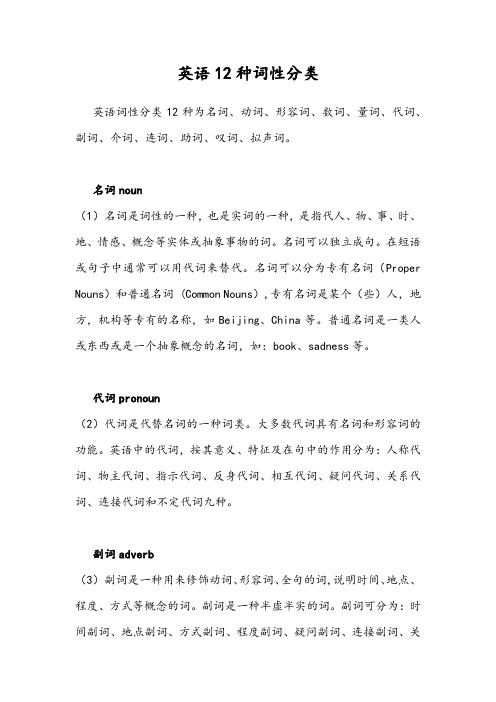
英语12种词性分类英语词性分类12种为名词、动词、形容词、数词、量词、代词、副词、介词、连词、助词、叹词、拟声词。
名词noun(1)名词是词性的一种,也是实词的一种,是指代人、物、事、时、地、情感、概念等实体或抽象事物的词。
名词可以独立成句。
在短语或句子中通常可以用代词来替代。
名词可以分为专有名词(Proper Nouns)和普通名词 (Common Nouns),专有名词是某个(些)人,地方,机构等专有的名称,如Beijing、China等。
普通名词是一类人或东西或是一个抽象概念的名词,如:book、sadness等。
代词pronoun(2)代词是代替名词的一种词类。
大多数代词具有名词和形容词的功能。
英语中的代词,按其意义、特征及在句中的作用分为:人称代词、物主代词、指示代词、反身代词、相互代词、疑问代词、关系代词、连接代词和不定代词九种。
副词adverb(3)副词是一种用来修饰动词、形容词、全句的词,说明时间、地点、程度、方式等概念的词。
副词是一种半虚半实的词。
副词可分为:时间副词、地点副词、方式副词、程度副词、疑问副词、连接副词、关系副词、频率副词和说明性副词等。
动词 verb(4)动词是表示动作、行为、心理活动或存在变化等的词。
例如:表示动作行为:走、坐、听、看、批评、宣传、保卫、学习、研究、进行、开始、停止、禁止。
介词 preposition(5)介词(preposition 简写prep.)又称作前置词,表示名词、代词等与句中其他词的关系,在句中不能单独作句子成分。
介词后面一般有名词、代词或相当于名词的其他词类、短语或从句作它的宾语,表示与其他成分的关系。
介词和它的宾语构成介词词组,在句中作状语,表语,补语,定语或介词宾语。
同时介词的用法也很灵活,同一个介词可以表达多种意义,介词可以分为时间介词、地点介词、方式介词、原因介词、数量介词和其他介词。
形容词 adjective(6)形容词是表示人和事物的形状、性质或表示动作、行为的性质状态的词。
小学阶段应该学习哪些英语语法知识?
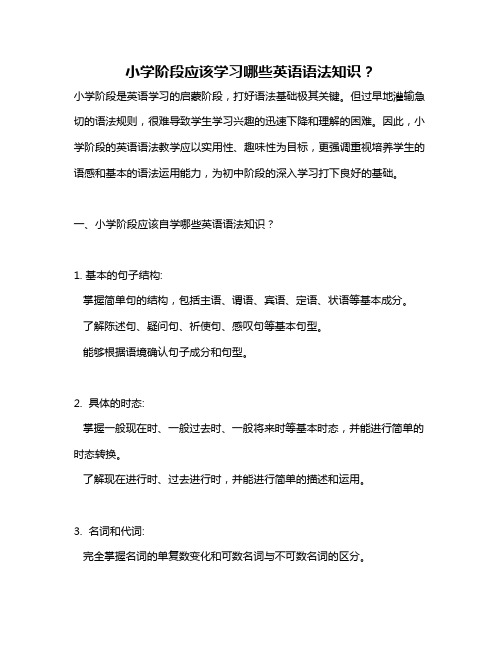
小学阶段应该学习哪些英语语法知识?小学阶段是英语学习的启蒙阶段,打好语法基础极其关键。
但过早地灌输急切的语法规则,很难导致学生学习兴趣的迅速下降和理解的困难。
因此,小学阶段的英语语法教学应以实用性、趣味性为目标,更强调重视培养学生的语感和基本的语法运用能力,为初中阶段的深入学习打下良好的基础。
一、小学阶段应该自学哪些英语语法知识?1. 基本的句子结构:掌握简单句的结构,包括主语、谓语、宾语、定语、状语等基本成分。
了解陈述句、疑问句、祈使句、感叹句等基本句型。
能够根据语境确认句子成分和句型。
2. 具体的时态:掌握一般现在时、一般过去时、一般将来时等基本时态,并能进行简单的时态转换。
了解现在进行时、过去进行时,并能进行简单的描述和运用。
3. 名词和代词:完全掌握名词的单复数变化和可数名词与不可数名词的区分。
了解代词的种类和用法,并能正确使用代词代替名词。
4. 形容词和副词:了解形容词的比较级和最高级,并能进行简单的比较。
能够掌握最常见的副词的用法,并能用副词修饰动词、形容词或其他副词。
5. 介词和连词:掌握常见的介词和连词,并能理解其用法,如:in,on,at,did,around,for,anyway,and,because等。
二、小学阶段英语语法自学的策略:1. 注重语境的理解:语法自学不是背公式,而应与实际应用相结合。
通过情景对话、猜意思、故事阅读等,让学生在真实的语境中感受和理解语法规则。
2. 寓学于乐,激发兴趣:以游戏、歌曲、动画等形式,将语法知识融入到有趣的活动中,增加学生的学习积极性。
利用图画、实物等直观的教具,帮助学生理解抽象的语法概念。
3. 反复练习,巩固提高:通过反复练习和测试,帮助学生巩固语法知识,并能灵活运用到实际的语言表达中。
设计不同类型的练习题,如:填空、选择、改错、英译汉等,提高学生的综合运用能力。
4. 注重个性化学习:根据学生的不同学习特点和认知能力,采用灵活多样的教学方法,满足不同学生的学习需求。
小学英语语法连词介词

它们之间的逻辑关系
从属连词
定义:连接从句的连词 分类:根据功能可分为引导名词性从句的连接代词和连接副词 用法:在句子中起到承上启下的作用,使两个分句构成一个完整的意群 常见从属连词:that、which、who、whose、what等
转折连词
间的关系
用法:通常用 于描述时间、 地点、方式等
例子:in、on、 at、under等
合成介词
定义:由两个或两个以上的单词组成的介词 常见合成介词:in front of、because of、in spite of、except for等 用法:与普通介词一样,用于连接名词、代词或从句 注意事项:在使用合成介词时,应注意其与普通介词的区别和用法
短语介词
短语介词的定义 短语介词的构成 短语介词的用法 常见短语介词的总结
双重介词
双重介词的定义
常见的双重介词举例
双重介词的用法 双重介词与普通介词的区别
感谢 您的观看
汇报人:XX
but:表示转折关系,与前面的内容形成对比或对立 however:表示轻微的转折,强调与前面内容的有所不同或者出乎意料 yet:表示对比或者转折,强调与前面内容的有所不同或者出乎意料 in contrast:表示对比关系,突出强调与前面内容的差异
选择连词
什么是连词: 连词是用来连 接词与词、短 语与短语以及 句子与句子的
小学英语语法 连词介词
单击此处添加副标题内容
汇报人:XX
目录
CONTENTS
01 单击此处添加文本 02 连词 03 介词
xx
PART ONE
添加章节标题
xx
PART TWO
小学六年级英语语法知识点总结归纳
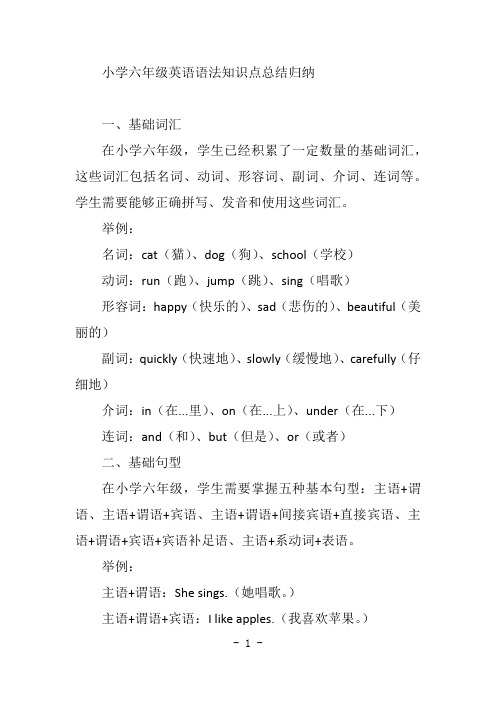
小学六年级英语语法知识点总结归纳一、基础词汇在小学六年级,学生已经积累了一定数量的基础词汇,这些词汇包括名词、动词、形容词、副词、介词、连词等。
学生需要能够正确拼写、发音和使用这些词汇。
举例:名词:cat(猫)、dog(狗)、school(学校)动词:run(跑)、jump(跳)、sing(唱歌)形容词:happy(快乐的)、sad(悲伤的)、beautiful(美丽的)副词:quickly(快速地)、slowly(缓慢地)、carefully(仔细地)介词:in(在...里)、on(在...上)、under(在...下)连词:and(和)、but(但是)、or(或者)二、基础句型在小学六年级,学生需要掌握五种基本句型:主语+谓语、主语+谓语+宾语、主语+谓语+间接宾语+直接宾语、主语+谓语+宾语+宾语补足语、主语+系动词+表语。
举例:主语+谓语:She sings.(她唱歌。
)主语+谓语+宾语:I like apples.(我喜欢苹果。
)主语+谓语+间接宾语+直接宾语:My mother gave me a book.(我妈妈给了我一本书。
)主语+谓语+宾语+宾语补足语:They elected him their monitor.(他们选他为班长。
)主语+系动词+表语:She is happy.(她很高兴。
)三、时态在小学六年级,学生需要掌握一般现在时、现在进行时、一般过去时和一般将来时这四种时态的基本用法。
举例:一般现在时:She always goes to school on time.(她总是按时上学。
)现在进行时:She is studying now.(她现在正在学习。
)一般过去时:Yesterday, we visited the zoo.(昨天,我们参观了动物园。
)一般将来时:I will go to the park tomorrow.(我明天将去公园。
)四、动词的基本形式学生需要了解动词的基本形式,包括原形、第三人称单数形式、现在分词、过去式和过去分词。
小学英语语法连词介词
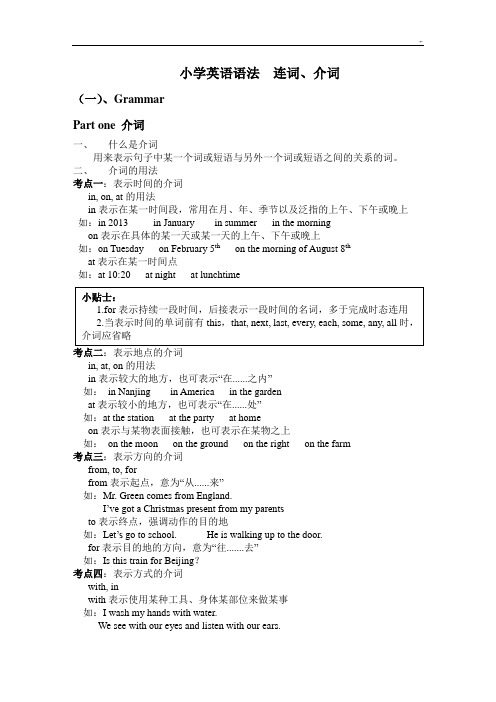
小学英语语法连词、介词(一)、GrammarPart one 介词一、什么是介词用来表示句子中某一个词或短语与另外一个词或短语之间的关系的词。
二、介词的用法考点一:表示时间的介词in, on, at的用法in表示在某一时间段,常用在月、年、季节以及泛指的上午、下午或晚上如:in 2013 in January in summer in the morningon表示在具体的某一天或某一天的上午、下午或晚上如:on Tuesday on February 5th on the morning of August 8that表示在某一时间点如:at 10:20 at night at lunchtime考点二:表示地点的介词in, at, on的用法in表示较大的地方,也可表示“在......之内”如:in Nanjing in America in the gardenat表示较小的地方,也可表示“在......处”如:at the station at the party at homeon表示与某物表面接触,也可表示在某物之上如:on the moon on the ground on the right on the farm考点三:表示方向的介词from, to, forfrom表示起点,意为“从......来”如:Mr. Green comes from England.I’ve got a Christmas present from my parentsto表示终点,强调动作的目的地如:Let’s go to school. He is walking up to the door.for表示目的地的方向,意为“往.......去”如:Is this train for Beijing?考点四:表示方式的介词with, inwith表示使用某种工具、身体某部位来做某事如:I wash my hands with water.We see with our eyes and listen with our ears.in表示使用某种语言如:Can you say it in English?一、填上合适的介词1. There is a supermarket _________ my house.2. Gao Shan is ______ duty today.3. Liu Tao often helps me ________ my study.4. My birthday is ________ October 21.5. There are lots of apples _______ the tree.6. I like reading and I can learn a lot ______ it.7. I can’t find the basketball. Maybe it’s ______ the door.8. I can buy some flowers _______ you.9. I get up ______ seven _______ the morning.10. Jack, please look _______ your things.二、根据中文提示,完成下列句子1. 墙上有许多标志。
英语语法之介词 连词

介词
• (3)in表示“在某一段时间( 月份、季节)里”。如:in the afternoon, in September, in summer, in 2005…
过……后(未来时间) I will be back in an hour. 我一小时后就会回来。
介词
• 2、表示地点: at, in, on, under, over, above, below, near, by, between, among, around, in front of, behind, into, out of, along, across, through, to, for, from
介词
• 介词:一种虚词。不能单独作句 子成分,它只有跟它后面的宾语 一起构成介词短语,才能在句子 中起作用。 有:in, out of, on, under, before, after, behind, near, opposite, with, about, for, against, from, to, by, like
连词
• 连接2个对等的单词、短语或者2 个句子。有: and, or, both…and…, but, before, after, until, then, because, so.
练习
o • It is time t___(1) go home n now. I’m in a bus o___(2) a rainy day, and a woman ith w___(3) a dog gets on the bus. It is a big dog and his eet f____(4) are not clean.
练习
5) Look at those birds ___ ( on, in ) the tree. 6) We are going to meet __ ( at, on, in ) the bus stop ___ ( at, on, in ) half past ten.
【免费】小学三年级英语语法:介词、连词和感叹词
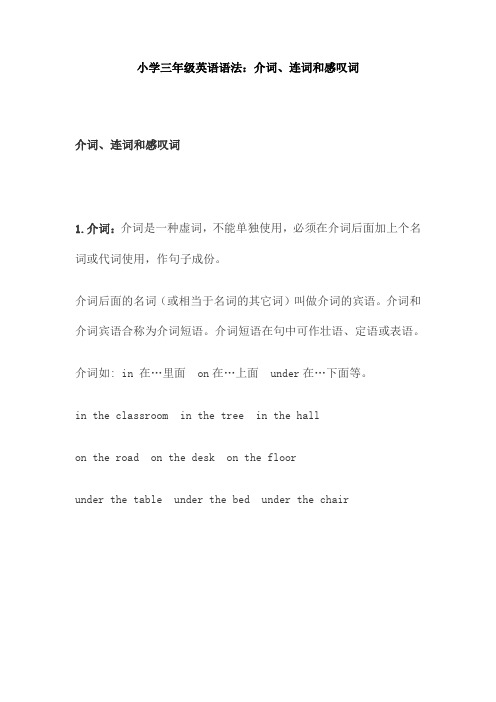
小学三年级英语语法:介词、连词和感叹词介词、连词和感叹词1.介词:介词是一种虚词,不能单独使用,必须在介词后面加上个名词或代词使用,作句子成份。
介词后面的名词(或相当于名词的其它词)叫做介词的宾语。
介词和介词宾语合称为介词短语。
介词短语在句中可作壮语、定语或表语。
介词如: in 在…里面on在…上面under在…下面等。
in the classroom in the tree in the hallon the road on the desk on the floorunder the table under the bed under the chair2.连词:连词是用来连接词与词、短语与短语、句子与句子等的词叫连词。
连词是一种虚词,在句子中不能单独作句子成分。
连词分两类:一类叫等立连词,另一类叫从属连词。
(1) 等立连词是用来连接同等的词、词组和分句的。
等立连词有许多,我们现在只学到了and和but,其他的以后学到再介绍。
如:A and B ; blue and white ;an apple and a banana; a car and a bus; Lucy and Ben ; Ben and Kitty ;This is a lorry and that's a drill.I like dolls and you like robots.(2) 从属连词是用来引起从句的、从属连词又分为引起名词性从句的连接词,如:if ,that 等。
引起壮语从句的连接词,如:when , after ,befare等。
以后会逐渐学到再介绍。
3.感叹词:表示说话人的某种感情(惊讶、高兴、痛苦等)的词叫感叹词。
感叹词后常用感叹号。
常用的感叹词有:oh(表示惊奇或痛苦),ah(表示惊奇或满意),hello(常被用来打招呼相当于汉语的“喂!”),well(表示惊讶,无奈)如:Hello.Are you Mary?练习:翻译下列词组1.在桌子上面2.在树下面3.在椅子上面4.在盒子里面5.在黑板上6.在书里7.在脸上8.在公共汽车上9.一只猫和一只狗. 10.又小又胖答案:1. on the desk2. under the tree3. on the desk4. in the box5. on the blackboard6. in the book7. on the face8. on the bus9. a cat and a dog 10. small and fat。
- 1、下载文档前请自行甄别文档内容的完整性,平台不提供额外的编辑、内容补充、找答案等附加服务。
- 2、"仅部分预览"的文档,不可在线预览部分如存在完整性等问题,可反馈申请退款(可完整预览的文档不适用该条件!)。
- 3、如文档侵犯您的权益,请联系客服反馈,我们会尽快为您处理(人工客服工作时间:9:00-18:30)。
小学英语语法连词、介词〔一〕、GrammarPartone介词一、什么是介词用来表示句子中某一个词或短语与另外一个词或短语之间的关系的词。
二、介词的用法考点一:表示时间的介词in,on,at的用法in表示在某一时间段,常用在月、年、季节以及泛指的上午、下午或晚上如:in2021inJanuaryinsummerinthemorningon表示在具体的某一天或某一天的上午、下午或晚上如:onTuesdayonFebruary5thonthemorningofAugust8t hat表示在某一时间点如:at10:20atnightatlunchtime小贴士:考点二:表示地点的介词表示持续一段时间,后接表示一段时间的名词,多于完成时态连用in,at,on的用法2.当表示时间的单词前有this,that,next,last,every,each,some,any,all时,in表示较大的地方,也可表示“在......之内〞介词应省略inAmerica inthegarden如:inNanjingat表示较小的地方,也可表示“在......处〞如:atthestationattheparty athomeon表示与某物外表接触,也可表示在某物之上如:onthemoon onthegroundontherightonthefarm1.考点三:表示方向的介词from,to,forfrom表示起点,意为“从......来〞如:Mr.GreencomesfromEngland.I’vegotaChristmaspresentfrommyparentsto表示终点,强调动作的目的地如:Let’sgotoschool.Heiswalkinguptothedoor.for表示目的地的方向,意为“往.......去〞如:IsthistrainforBeijing?考点四:表示方式的介词with,inwith表示使用某种工具、身体某部位来做某事如:Iwashmyhandswithwater. Weseewithoureyesandlistenwithourears.in表示使用某种语言如:CanyousayitinEnglish?一、填上适宜的介词Thereisasupermarket_________myhouse.GaoShanis______dutytoday.LiuTaooftenhelpsme________mystudy.(Mybirthdayis________October21.Therearelotsofapples_______thetree.IlikereadingandIcanlearnalot______it.7.Ican ’tfindthebasketball.Maybeit’s______thedoor.Icanbuysomeflowers_______you.Igetup______seven_______themorning.Jack,pleaselook_______yourthings.二、根据中文提示,完成以下句子墙上有许多标志。
There_________alotof_____________________thewall.你可以把我们学校的情况告诉他。
Youcan_________him_________ourschool.他们正在谈论周末方案。
Theyaretalking________theirplans_________theweekend.南京夏天热吗?__________ithot_____________Nanjing________summer?你们能在邮局前面乘8路公交车。
Youcan________busNo.8_______________________thepostoffice.Parttwo连词一、什么是连词在句子中起连接作用,可以使词、短语或句子连接起来形成一定关系的词。
二、连词的用法考点一:并列连词1〕and:“和,并且〞表示并列2〕both...and:两者“都......表示〞连接3〕or:或“者,还是〞表示选择4〕but:但“是〞表示转折5〕notonly...butalso...:不但......“而且......表示〞并列,但说话中心侧重后者考点二:附属连词1〕because:因“为〞,表示原因,提问时用why2〕when:“当......时候〞,引导时间状语从句小贴士一、用适当的连词完成以下句子1. 在并列结构中,and通常butalso用于肯定句,or那么用于否认疑问句。
1.He2.oftennotonlyhelps...betthem,also___________...在连接两个并列主语时,谓语动词的形式与hefeelshappy.2.You后面的主语保持一致。
canwatchit,_______youcan’ttouchit..3 Which3.在英语中,isbigger,becausethisone与_________so不能连用,二者只用其一。
thatone?4.Bothmyfather________mymotheraredoctors.5.---Whyareyouabsenttoday? ---________Ican ’tcatchthebus.6.LiMingjumpsfarther_______LiuTao.二、同义句转换1.Weshouldlearnfrombooksandweshouldlearnfromteachers. Weshouldlearn___________frombooks__________fromteachers. Menwilldiewithoutairandwater.Mencan’tlivewithoutair_____water. HelenandNancywereborninthesameyear.Helenis__________________________Nancy.4.Shewasill,soshewasn’tatsch ool.__________shewasill,shewasn ’tatschoo l.一、单项选择()1.Ihavegotapresent.Itis_________mymother.A.fromB.forC.toD.of()2.Doyouknowthegirl______red?A.inB.withC.ofD.to()3.Icanseemanytrees________theclassroom.A.infro ntofB.inthefrontof C.infront D.inthefront()4.What’swrong________you.A.forB.ofC.withD.in()5.Hurryup.It’stime______class.A.inB.forC.ofD.to()6.Shestoodup________wentout.A.andB.orC.soD.but()7.Whoisright,Jacky________John?A.andB.butC.soD.or()8.Heisclever,________heislazy.A.butB.andC.soD.or()9.Itisrainingoutside,_______Ihavetostayathome.A.soB.andC.butD.or()10._______myfather_______mymotherareteachersA.Neither,or B.Both,andC.Either,or D.Not,but()11.Bequick,_______you’llmissthetrain.A.butB.andC.or D.so二、用下面方框中的介词填空。
〔可重复使用〕at,wi th,for,out,to,like,inMr.Blackisaveryoldman.Everymorninghegoes______awalkinthepark.Andhecomesback________tenthirtyfor hislunch_______themiddleoftheday.Buttodayacarstops__________hishouseateleveno’clock.Twopolicemenhelphimget__________.Oneofthem says______MrBlack’sdaughter,“Theoldmancan’tfindhiswayhomeinthepark.Heasksusto takehimhome______thecar〞.Thedaughterthanksthepolicemen_______that.Aftertheyleave,sheasksherfather,“Dad, yougototheparkeveryday.Buttodayyoucan’tfindtheway.What’swrong______you?〞The oldmansmiles______achildandsays,“OfcourseIcanfindmywayhome.ButIdon’twanttowalkhome,youknow.〞三、改错()1.Bothyouandshehasthesamehobby._____________ A B C D()2.NotonlyyoubutalsoHelenlikecollectingstamps._____________A B C D()3.Whojumpshigher,Mikeand David?_____________ A B C D)4.Because shewasill,soshewas absent._____________(AB C D ()5.Thispr esentisasnicerasthatone._____________AB C D〔二〕语法知识拓展扩充连词的用法both⋯and两者都Sheplays(both)thepianoandtheguitar.neither⋯nor意思"既不⋯⋯也不⋯⋯",采用就近原,与nor后的保持一致。
Neitheryounorhe is toblame.either......or......或者......或者......;要么......要么......采用就近原notonly⋯but(also)不但......而且.......采用就近原Notonlyyoubutshe likes reading. so......that......如此···以至于···Heis sokind thateverybodylikeshim.such......that......如此···以至于···Heis suchakindman thateverybodylikeshim.即学即()1.Speakslowly,___wecanunderstandyou.A.andB.orC.ifD.because()2.Wehad_______badweatheryesterdayevening_________therewerefewpeopleonthe street.A.such;that B.sucha; C.so;that D.soa;that()3._______Lucy_________LilylikesChinese,buttheirChineseispoor.A.Both;and B.Notonly;butalsoC.Either;or D.Neither;not()4.---Ithink______Jack_______Dickaresuitableforthejob.Ireallycan’tdecid ewhchoose.---IfIwereyou,Dickwouldbeabetterchoice.A.both;an dB.either;orC.notonly;butalso D.so;that()5.I’venotimetotalkwithyou.Youmay______stayhere______gowithme.A.both;an dB.either;or C.neither;nor D.notonly;butalso〔三〕ReadingPhotofunPhotomachinesarefunandpopular.Theyletone,two,orevenfivepeopletakephotostogether.Then,peopleadddesi gnstothepictures.Theresultcanbeverycuteandfunny.Themachinepreparesthephotosveryquickly–injustaminuteorso.Friendslovetotakepicturestogether.Theyalsoliketogivephotostootherfriends.Peoplecollectmanyofthesma llphotosinplasticholders.VocabularyPracticeWritethecorrectwordineachblank.machinecutepreparecollectplastic1.Ioften__________lunchformybrotherandsister.小学教学英语语法连词介词Yourlittledogisso__________.Myfriendsall__________sportscards.Acomputerisanincredible________________.ReadingPracticeChoosethebestanswer.( )1._________peoplecantakephotostogether.A.FiveB.OnlyoneortwoC.LessthanfiveD.Fifty( )2.ThearticledoesNOTsaypeoplecan_________.A.takephotoswithfriendsB.adddesignstotheirphotosC.gettheirphotosquicklyD.getplasticholdersfromthephotomachines ( )3.Whatdoes “ormean?so〞A.AboutB.Exactly more thattime( )4.Whichofthefollowingistrue?A.Peopledon ’tliketosharetheirphotos.B.It ’shardtocollectsmallphotosC.Ittakesabout60secondstogetthephotosfromthemachineD.Thephotomachineschoosethedesignofthephotos.LanguagePracticeCombinethetwosentencesintoonesentence.Thecarsarenew.Thecarsareexpensive._______________________________________________________________ WecangotoJapan.Or,wecangotoKorea._______________________________________________________________ Lisaworksatacoffeeshop.Thecoffeeshopisinanothercity._______________________________________________________________ Newwords:mach ine n.机器popularadj.流行的add v.加desi gn v.设计result n.结果cuteadj.可爱的prep are v.准备plastic adj.塑料的holdern.支持物阅读练习:完形填空〔建议5分钟〕RoseandMartinare____1____Canada.Theyaregoodfriends.They__2____fishing.They___3___dance.RoselikesChineseverymuch.Martinlikesmaths.They___4__schoolfiveorsixdaysaweek. Theyplaygames___5____TuesdayandThursday.Theystay____6____homeonSaturdayandSunday.TheyhavetwoChinesefriends.____7___namesareLiLeiandWangLin.All ofthemarein___8___sameclass.Theyliketheirschool.They__9____,“TheChinesepeopleareveryfriendly,thefoodisnice,____10___〞.()1.A.to B.of C.from D.on()2.A.like B.can C.are D.wouldlike ()3.A.goes B.are C.wouldlike D.can()4.A.goesto B ing C.leave D.goto()5.A.at B.on C.of D.in()6. A.away B.out C.at D.in()7. A.His B.Their C.Our D.Theirs()8. A./ B.an C.the D.a()9. A.talk B.say C.speak D.tell()10.A.veryB.tooC.muchD.many根据短文内容完成句子〔每空一词〕 (建议5分钟)A Mrs.WilliamsisaCanadiandoctor.SheisnowinNanjingwithherhusband.Theirchildrenare intheirhometownwiththeirgrandparents.Sheworksinahospital.ShelikesChinesemedicinevery much.ShewantstoknowmuchaboutChinesemedicinethere.Sheworkshardinthedayinthehospitalan dreadsEnglishbooksonChinesemedicineatnight.ShelearnsChinesefromtheChinesedoctors.Now shecanspeaksomeChineseandreadsomeChinese,too.HerhusbandMr.Williamsisamanager(经理)ofabigcompany.Heworkshard,too.Hegoestoworkonweekdays.Sometimes,onSaturdayandSunda y,hehastowork.Heisverybusy.Hehasmanythingstodoeveryday. Mrs.Williamscomesfrom__________.Theirchildrenarestayingathomewiththeir___________. NowMrs.Williamscanspeak_________Chinese. Mrs.WilliamslikesChinese_________verymuch.From________to_______,Mr.Williamsgoestoworkeveryday. (四)、FunnyEnglish 生活小百科( (((()1._________isNOTwrittenbyAnderson. A.RedShoes B.Cinderella 〔灰姑娘〕 C.Thumbelina 〔拇指姑娘〕 D.TheUglyDuckling )2.WhatkindofgamedochildrenplayatHalloween?A.SnakesandLadderB.TrickorTreatC.HopscotchD.TicTacToe )3.Whatdoesthe Chineseword“年〞meanatfirst. A.Achicken B.Aperson monster D.Acock )4.Nanjingisknownasthecapital(都城)of____dynasties(朝代)inthehistory. A.six B.seven C.eight D.nine)5.Whichcountryisnotoneofthefourcivilizedcountries 〔文明古国〕. A.China B.Egypt C.Japan D.India. 脑筋急转弯Heisnotmyuncle.Butheismygrandpa’sson.Whoishe?___________ Whatdoyoudofirstwhenyouwakeupinthemorning?_____________ Whyistheriververyrich?___________________________Whichhospitalnevertreats 〔治疗〕people?_________________ Whatmatchcan ’tbeputinamatch -box?_________________ (五)、名校真题链接 一、单项选择(((()1.Hewasangry______whatIsaid. A.for B.with C.at)2.Ibegantoworkhere______March,1978. A.in B.at C.on )3.Igoshopping______mymommy.A.withB.inC.and )4.Fathergivesanicepresent______me.D.on D.toD.for(()5.ChristmasDayis______thetwenty-fifth______December.A.on,inB.on,ofC.in,ofD.on,on)6.Look!Thereisalovelybirdsinging______thetree.Yeah!Therearealsomanyapples______thetree.A.in,onB.in,inC.on,inD.on,on二、用适当的填空because and so or butLucy______Iaregoodfriends.Sheisweak,______shenevergiveupexercising.Hurryup,______youwillmissthelastbus.Ibuyacat______mymotherlikescatverymuch.Theskyisgrey______Ibringanumbrella.三、用适当的介填空EveryMondayIstay______home.Itisnotcoldhere______winter.Wehavefourclasses______themorningandtwoclasses______theafternoon. Theywillhaveanexam______Saturdayafternoon. Pleaseanswermyquestion______English.Thereisnodifference______thetwoshirts.7.They willcomeback______twoo’clock.8.Heisgood______English.Homework()1.Theyareallnew,________I’mno t.A.andB.butC.soD.or()2.Istherealetter______apostcard?There’saletter.A.andB.orC.notD.but (oldwomancan’tread______write.A.andB.orC.butD.andcan()4.____________myclassmates________ourclassteacherwastherethen.A.notonly⋯butalso⋯B.both⋯and⋯C.Neither⋯or⋯D.Either⋯nor⋯()5.Haveonemoretry,______youwillnotsucceed.A.andB.orC.thenD.but ()6.____youareill,youshouldseethedoctorrightnow.A.IfB.ThoughC.UntilD.Since ()7.______themidnighthewaitedforhismother.A.TillB.SinceC.UntilD.At (mendrivers______thewomandriverhavebeentothevillage.A.Neither⋯nor⋯B.Both⋯andC.Either⋯or⋯D.Noneof⋯and⋯(isthelady_______helpedtheoldwomanyesterday.A.whomB.whichC.whatD.who ()10.Lucyhasseenthefilm,_______Lilyhasn’t.A.andB.orC.butD.so ()11._______themorningofMay1st,wevisitedtheoldman.A.OnB.AtC.InD.With)12.Mostpeoplework______thedayandsleep______night.A.on;atB.in;inC.in;atD.on;on)13.LinspeaksEnglishbest______theboystudents.A.betweenB.withC.onD.among)14.Awolf____asheepskinoftenmakesusconfused〔迷惑〕.A.withB.inC.onD.ofwillcomeback_____threedays.A.afterB.forC.inD.on)16.Theygavethebagtous______mistake.A.byB.forC.onD.with)leftXi’an____acoldwintermornin g.A.atB.beforeC.onD.in )is_____thesouthwestofChina.A.inB.onC.toD.off )19.______mymother’shelp,Isucceededin finishingthework.A.UnderB.OnC.WithD.In)fatherisverystrict_____meandhe’sverystrict___hiswork,t oo.A.with;onB.with;in C.in;with D.with;with。
